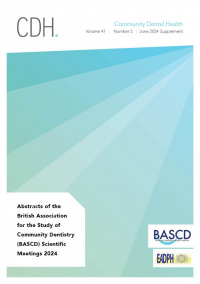March 2011
Correlation between oral health perception and clinical factors in a Brazilian community
Abstract
Objective: The aim of this study was to analyse associations between self-perception of oral health and relevant clinical, personal and socio-demographic factors in a Brazilian community. Material And Methods: Urban adults living in a city in southern Brazil were interviewerd and examined. Individuals with acute pain and who needed multiple extractions of teeth were excluded. Self-perception and the Oral Health Impact Profile (OHIP-14) were applied to measure the impact of oral conditions on the quality of life. Socio-demographic and clinical indicators were also analysed. Results: The clinical examination revealed a high dental caries experience (DMFT = 18.9) and a high prevalence of periodontal disease. Oral condition was considered “normal” by 42% of respondents. The variables associated with the OHIP-14 were: education, age, self-assessment, dental caries and the DMFT index. Conclusions: Self-perception of oral health was associated with OHIP-14 and the clinical indicators had low influence in the self-perception. Therefore, the development of educational initiatives and preventive strategies for the adult population is recommended. Key words: Dental health surveys, health conditions, oral health; questionnaires, self-concept, socioeconomic factors.




